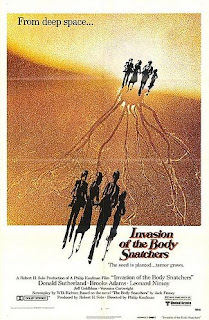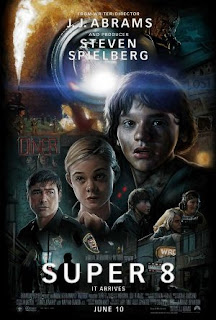Readers familiar with Christopher Guest's mock documentary
A Mighty Wind (2003) will find a kindred spirit in Robert Altman's
Nashville (1975), a sort of character mosaic of Nashville life. It has more guts and honesty than
A Mighty Wind, though. It's ironic and funny, but it also treats its subjects with a much deeper care for the tragic futility of their pursuits. Altman depicts the city as an eclectic--or maybe just eccentric--mixture of a countrified Hollywood and a evangelicized D.C. It's the kind of place where its celebrities exercise their vices on Saturday and sing solos in church on Sunday. The cast, which is gargantuan, reportedly did a lot of its own musical material, lending an improvisational quality to the movie. But it goes on forever.
The movie doesn't wallow in the despair of its characters, all of whom are pretty depressed (subconsciously if not openly), it just forces us to watch as they collapse in front of fans or put on a happy face to make it through another performance or interview or party, or whatever the occasion is.
Nashville might not feel as relevant to today's reality TV audience. The has-been celebrities with their narcissism on constant display make complete buffoons of themselves on a regular basis. In
Nashville, no one is
trying to look foolish. Everyone's hanging on to their dignity like it's a tattered old coat, the only one they have left.
You do feel for some of the characters, and when you're not feeling very involved, which is about half of the time. (The movie is 160 minutes), there's always the music to pull you back in. Somehow, the music makes the movie make sense. One of Altman's earlier films,
The Long Goodbye, had a wonderfully distant, decayed mood to it, but it also seemed rambling and at times uninvolving. It captured the sort of ugly truth of 1940's film noir, which may have been cynical, but carried a sort of mythology about it that being a private eye was glamorous. Altman got through to audiences the reality of the job, via Elliott Gould's deadpan, madly dogged Phillip Marlowe.
Gould shows up here in a cameo as himself, schmoozing with a country music star named Haven Hamilton (Henry Gibson), who's like a much shorter combination of Johnny Cash and Willie Nelson. He's absolutely ridiculous, and yet he's worshiped by his devoted fans as though he's the King of Nashville. His wife (played well by Barbara Baxley) is a shriveled up booze-bag with a booming, wailing, siren of a voice. She's hysterically funny. She's so obsessed with the Kennedys that she goes to mass on Sundays, and her boozing seems to be rooted in a sense of loss for the "Camelot" dynasty.
Nashville was highly praised when it came out in 1975, and perhaps the exciting promise of the actors involved with it, and the hipness that was associated with liking Robert Altman's films, contributed to its success with critics. As a musical--much of the film features original country songs performed by many of the actors playing musicians--it's one of the most authentic of its genre. In fact, this might be the truest sense of what a musical is, realistically. The realism of the music business is a picture of diminishing ideals and increasing profits.
I think Altman comes close to importing into the 1970s the mood that F. Scott Fitzgerald created about the 1920s. Fitzgerald wrote about how the American Dream was really something corrupt, decayed, and desperate. This is a movie about trying to please the world in the midst of corruption, decay, and death. Physical death to be sure, but also a kind of inner personal destruction. Ronee Blakley comes off very well as Barbara Jean, a beautiful country singer, genuinely in love with her fans, who's losing it and can't accept the reality. She keeps having mysterious health scares in public, and Altman paints her as a tragic figure. She's absolutely beautiful when she sings.
Another character, a reporter for the BBC named Opal (Geraldine Chaplin), is truly voyeuristic in her fascination with America (she's apparently doing research for a documentary on Nashville's music scene). Opal makes a frighteningly funny observation about a car crash that happens early in the movie: that crash, she says, is inherently American. It's fast, violent, brutal, and deadening. Altman underlines this later with a scene of the reporter talking into a recorder while she wanders about a demolition center. The cars are mangled and in some cases unrecognizable, and she even compares the reddening rust to dried blood stains.
Lily Tomlin also makes an impression as a mild-mannered housewife who sings in the choir of a black church. Tomlin has such a wonderful comic energy. When she laughs, it seems to erupt out of her and fill up the room. We see this in a movie she did several years later called
The Late Show. It's here too, but mitigated by her character's sense of unhappiness. There's a wonderful scene where she watches Keith Carradine's character perform the song, "I'm Easy." Paul Lohmann's camera closes in on her sad face, which seems torn between the guilt of following her desires and the guilt of letting them slip away for morality's sake. Quite a wonderful paradox of inner-conflict. Tomlin was nominated for an Oscar.
The music is admittedly wonderful--even though I'm not crazy about country music. It's very much alive, and I guess that's why
Nashville was so celebrated. It's surely a movie about that seemingly brief, magical moment of vitality in a person's sad march toward unhappiness, corruption, and death. It may be the most readily accessible theme in Altman's work as a director, too. As an epic, it's much more honest and heartfelt than a
Gone With the Wind or a
Giant. As a character study, the movie is pulled in so many different directions you feel at a loss to identify with many of them. It's a testament to the acting and the editing (credited to Dennis Hill and Sidney Levin) that the characters do come through most of the time.
With Ned Beatty, David Arkin, Timothy Brown, Shelley Duvall, Allen Garfield, Scott Glenn, Jeff Goldblum, Barbara Harris, David Hayward, Michael Murphy, Allan Nichols, Dave Peel, Gwen Welles,











